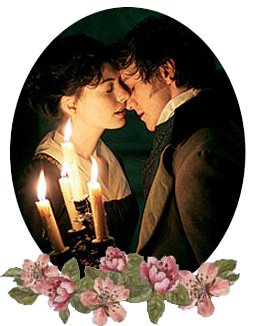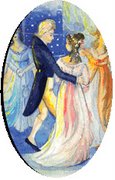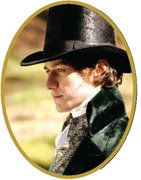This is quite a story for a simple quote,
but it pulled at my heartstrings, so I have to tell it!
I noticed our copy of the movie "A
Little Princess" and decided to watch it.
It was the ending that really made a point in my own life. Briefly, the story is about going from riches
to rags and back to riches.
At the end of the movie the young girl, Sara,
is speaking with her Father's friend, Mr. Carrisford, who makes her rich again. The conversation goes thusly:
Mr.
C.: "What are you thinking,
Sara?"
Sara: "I was just thinking about your
question, why Karma should have treated me so cruelly. I believe it was to teach me a lesson."
Mr.
C.: "What lesson?"
Sara: "There are so many poor people in the
world, I took my Papa's money for granted, you see. But I had no idea what it was like not to
have any."
Mr.
C.: "It taught me a lesson,
too. That money doesn't buy
happiness."
Sara: " But it prevents people from starving,
though, doesn't it? And gives them a
roof over their heads."
Mr.
C.: "Yes."
Sara: "I remember one day, when I was
particularly hungry, there was little girl outside a bun shop who was even
hungrier than I was. I wonder what
became of her, what becomes of all other children who don't have enough to
eat. I wish I could help them."
------------
Next Mr. C. and Sara visit the bun shop
where Sara offers to pay for any buns the Mistress gives to any hungry child
who comes by. The Mistress of the shop
has taken in that hungry girl, Anne, that Sara had given buns to even though at
the time Sara was poor and hungry. Sara
and Mr. C. leave the shop and
Anne
says: "Who is she, Ma'am? I thought she was poor like me!"
Mistress: "Poor?
That little one's never been poor.
Not even when she hadn't a penny to her name."
------------------
The movie ends with Sara saying: "It's
the magic, that's what it is. The Magic. Remember I told you that when things are at
their blackest, the magic always comes to your rescue? Well, it's come. It's just like being a princess after
all."
-----------------
My Point being - that no matter how bleak
life may seem, it could always be worse.
Now what has that got to do with our own Tom Lefroy. Well, I must quote him. The quote is a letter Tom wrote to his wife
from the "Memoir of Chief Justice Lefroy" on page 47 at this site:
TO HIS WIFE.
Castle Connell,
Wednesday.
She is a striking instance how utterly inadequate what is called
firmness or strength of mind is to contend with affliction. Nothing can do that
but what teaches us that it is good for us that we are afflicted, and makes us
see through our very heaviest trouble the merciful purpose of Him who makes us
perfect by suffering, but who at the same time that He sends the rod, holds out
the staff also. There is in true piety a humility of mind, a bowing down of the
spirit, an acquiescence in all that comes, as coming from the source of love,
which proceeds from faith to patience, from patience to resignation, and from
resignation at length kindles into joy, that holy joy which is allied with
peace, the joint offspring of that Holy Spirit who alone can bind up the broken
heart and pour oil into those wounds which set human consolation at defiance.
If, in prosperity, we prepare for trials, we shall never be taken entirely by
surprise ; and this I believe is another way by which religion makes good its
promises of increased comfort, even in this life.
T. L.
His language is a bit hard for me to cipher
out, but I hope I get the gist of what he means because I think it is
beautiful. It puts into words my own
belief. And to think he wrote those
words so long ago - over 150 years!
Also, to put the quote in context, it is
best to read at least the preceding pages from page 45. I think I must read the Memoir in its
entirety!
The moral of the story reminds me of the
old saying "I cried because I had no shoes until I saw the man who had no
feet."
Yrs aff'ly,
Linda the Librarian













































